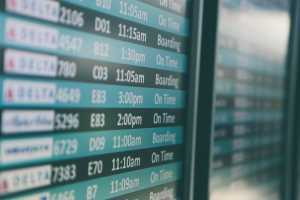Flight delays and cancellations are a regular occurrence in the aviation industry, causing lots of inconvenience for travellers across the globe. Flight disruption is naturally cited as a key performance indicator for measuring airline reliability. In such cases, customer service becomes the most important part of an airline’s response.
EasyJet is a famous low-cost flight carrier with headquarters at London Luton airport. Established in 1995, it has now become one of the largest European airlines, operating flights to 34 countries on over 900 different routes. What policy does the airline have in case of delay, and what do passengers need to know about EasyJet compensation?
The nature of flight delays and cancellations at EasyJet
According to statistical data from 2021, nearly 90% of flights were performed without any delays. Additionally, the EasyJet cancellation rate was 0.3%. Such data ranks EasyJet as one of the most punctual airlines.
However, disruptions still happen – and there are multiple reasons:
Challenging air traffic control environment
ATC is responsible for monitoring and directing the planes to ensure smooth traffic. Furthermore, due to the outbreak of war, the airspace over Europe has become limited, causing changes in the route's length and duration.
Strikes
The flight schedule can also be connected to strike actions by EasyJet cabin crew.
Adverse weather conditions
Thunderstorms, hurricanes, tornadoes, blizzards, and strong winds remain among the most frequent causes of flight delays or cancellations.
Mechanical issues
If such a mechanical issue occurs, passengers must wait until the end of maintenance and repair work – assuming it’s possible within an achievable timeframe.
Remember, whatever the reason for flight cancellations you may be entitled to to compensation of up to £520 under UK and EU regulations. Use a company like AirHelp to guide you through the process of applying if you're unsure.

Suganth / Unsplash
Passenger profiles
Here, we consider different types of passengers and the correlation between their expectations and needs, and flight disruptions:
Business travellers
Business travellers are, on the whole, demanding yet polite, organised and punctual. Any flight disruptions can negatively affect their tight business schedules. This aspect forces business travellers to take proactive measures in accordance with passenger rights. Communication between the airline and the business travellers in case of flight disruptions is important due to the dynamics of cooperation with companies that make corporate flight bookings.
Leisure Travelers/Families
Flight disruptions may entail unwanted changes to vacation planning details, including the transfer from the airport and the dates of check-in at the hotel. Such travellers demand immediate problem-solving actions from the customer service side.
Frequent Flyers
These travellers have experience with a certain airline and often have become loyalty programme members; they may expect expedited solutions due to their status.
Special Needs Passengers
Passengers with special needs may need additional medical assistance or equipment, and they may also suffer from emotional stress, which points to the importance of quick customer service responses.

Matthew Smith / Unsplash
How does EasyJet respond to flight disruptions?
According to EasyJet's policy concerning flight delays and cancellations, passengers whose flights are cancelled have the right to switch their flight for free, choose a voucher for the full value of the booking, or request a refund.
Additionally, the airline undertakes to provide accommodation for all passengers if their rebooked flight is not until the following day.
If the flight is delayed by two hours, the passengers are entitled to refreshment vouchers to the value of £3 or €4.50. The delays over five hours give the passengers the right to change their flights. Also, if the circumstances don't allow passengers to depart until the following day, the airline is obliged to provide people with accommodation.
EasyJet notifies passengers of schedule changes via email or SMS. Flight trackers, social media, customer service hotlines, and mobile app alerts are also important communication channels.
How effective is customer service at EasyJet?
Last summer was a busy one for EasyJet – and more than 1,700 flights were cancelled. Over 180,000 passengers were compensated for the inconvenience: they were rebooked for another flight or offered a refund.
All in all, EasyJet complies with industry standards and holds its position as a leading low-cost European airline.
How delays and cancellations affect passenger loyalty
Flight delays and cancellations always cause dissatisfaction from the passengers, so effective communication is the key to preserving customer loyalty and airline reputation. In particular, flight delays lead to decreased demand among the passengers, not to mention financial loss and operational disruptions for the airline.
To mitigate the negative impact of flight disruption on passengers' future loyalty intentions, the airline is obliged to follow all the points in the provided policy for flight delay and cancellation cases.
Strategies for enhancing passenger retention and satisfaction also include providing efficient and timely customer service, offering personalised and tailored Experiences, and implementing a comprehensive loyalty program.
Customer service responses strongly correlate with passenger profiles and with the way flight disruptions will impact the airline's image. Major airlines like EasyJet are obliged to provide quick customer service in accordance with official policy. Immediate actions and a tailored approach are the key to solving the problem efficiently.
